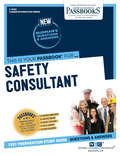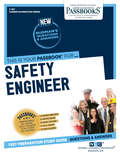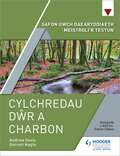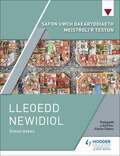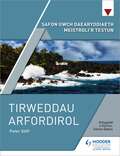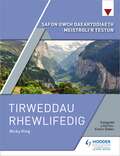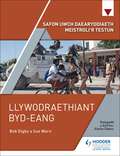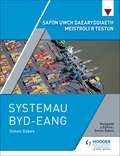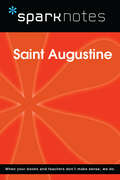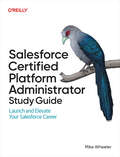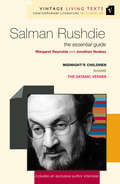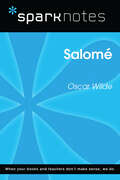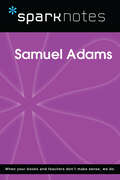- Table View
- List View
Safety Consultant: Passbooks Study Guide (Career Examination Series)
by National Learning CorporationThe Safety Consultant Passbook® prepares you for your test by allowing you to take practice exams in the subjects you need to study. It provides hundreds of questions and answers in the areas that will likely be covered on your upcoming exam.
Safety Engineer: Passbooks Study Guide (Career Examination Series)
by National Learning CorporationThe Safety Engineer Passbook® prepares you for your test by allowing you to take practice exams in the subjects you need to study. It provides hundreds of questions and answers in the areas that will likely be covered on your upcoming exam.
Safon Uwch Daearyddiaeth Meistroli'r Testun: Cylchredau Dwr a Charbon
by Andrew Davis Garrett NagleExam board: AQA, Edexcel, OCR, WJEC/EduqasLevel: A-levelSubject: GeographyFirst teaching: September 2016First exams: Summer 2017 (AS); Summer 2018 (A-level)Master the in-depth knowledge and higher-level skills that A-level Geography students need to succeed; this focused topic book extends learning far beyond your course textbooks.Blending detailed content and case studies with questions, exemplars and guidance, this book:- Significantly improves students' knowledge and understanding of A-level content and concepts, providing more coverage of The Water and Carbon Cycles than your existing resources- Strengthens students' analytical and interpretative skills through questions that involve a range of geographical data sources, with guidance on how to approach each task- Demonstrates how to evaluate issues, with a dedicated section in every chapter that shows how to think geographically, consider relevant evidence and structure a balanced essay- Equips students with everything they need to excel, from additional case studies and definitions of key terminology, to suggestions for further research and fieldwork ideas for the Independent Investigation- Helps students check, apply and consolidate their learning, using end-of-chapter refresher questions and discussion points, plus tailored advice for the AQA, Edexcel, OCR and WJEC/Eduqas specifications- Offers trusted and reliable content, written by a team of highly experienced senior examiners and reviewed by academics with unparalleled knowledge of the latest geographical theories
Safon Uwch Daearyddiaeth Meistroli'r Testun: Lleoedd Newidiol
by Simon OakesMaster the in-depth knowledge and higher-level skills that A-level Geography students need to succeed; this focused topic book extends learning far beyond your course textbooks.Blending detailed content and case studies with questions, exemplars and guidance, this book:- Significantly improves students' knowledge and understanding of A-level content and concepts, providing more coverage of Changing Places than your existing resources- Strengthens students' analytical and interpretative skills through questions that involve a range of geographical data sources, with guidance on how to approach each task- Demonstrates how to evaluate issues, with a dedicated section in every chapter that shows how to think geographically, consider relevant evidence and structure a balanced essay- Equips students with everything they need to excel, from additional case studies and definitions of key terminology, to suggestions for further research and fieldwork ideas for the Independent Investigation- Helps students check, apply and consolidate their learning, using end-of-chapter refresher questions and discussion points- Offers trusted and reliable content, written by a team of highly experienced senior examiners and reviewed by academics with unparalleled knowledge of the latest geographical theories
Safon Uwch Daearyddiaeth Meistroli'r Testun: Lleoedd Newidiol
by Simon OakesMaster the in-depth knowledge and higher-level skills that A-level Geography students need to succeed; this focused topic book extends learning far beyond your course textbooks.Blending detailed content and case studies with questions, exemplars and guidance, this book:- Significantly improves students' knowledge and understanding of A-level content and concepts, providing more coverage of Changing Places than your existing resources- Strengthens students' analytical and interpretative skills through questions that involve a range of geographical data sources, with guidance on how to approach each task- Demonstrates how to evaluate issues, with a dedicated section in every chapter that shows how to think geographically, consider relevant evidence and structure a balanced essay- Equips students with everything they need to excel, from additional case studies and definitions of key terminology, to suggestions for further research and fieldwork ideas for the Independent Investigation- Helps students check, apply and consolidate their learning, using end-of-chapter refresher questions and discussion points- Offers trusted and reliable content, written by a team of highly experienced senior examiners and reviewed by academics with unparalleled knowledge of the latest geographical theories
Safon Uwch Daearyddiaeth Meistroli'r Testun: Tirweddau Arfordirol
by Peter StiffExam board: AQA, Edexcel, OCR, WJEC/EduqasLevel: A-levelSubject: GeographyFirst teaching: September 2016First exams: Summer 2017 (AS); Summer 2018 (A-level)Master the in-depth knowledge and higher-level skills that A-level Geography students need to succeed; this focused topic book extends learning far beyond your course textbooks.Blending detailed content and case studies with questions, exemplars and guidance, this book:- Significantly improves students' knowledge and understanding of A-level content and concepts, providing more coverage of Coastal Landscapes than your existing resources- Strengthens students' analytical and interpretative skills through questions that involve a range of geographical data sources, with guidance on how to approach each task- Demonstrates how to evaluate issues, with a dedicated section in every chapter that shows how to think geographically, consider relevant evidence and structure a balanced essay- Equips students with everything they need to excel, from additional case studies and definitions of key terminology, to suggestions for further research and fieldwork ideas for the Independent Investigation- Helps students check, apply and consolidate their learning, using end-of-chapter refresher questions and discussion points, plus tailored advice for the AQA, Edexcel, OCR and WJEC/Eduqas specifications- Offers trusted and reliable content, written by a team of highly experienced senior examiners and reviewed by academics with unparalleled knowledge of the latest geographical theories
Safon Uwch Daearyddiaeth Meistroli'r Testun: Tirweddau Rhewlifedig
by Nicky KingExam board: AQA, Edexcel, OCR, WJEC/EduqasLevel: A-levelSubject: GeographyFirst teaching: September 2016First exams: Summer 2017 (AS); Summer 2018 (A-level)Master the in-depth knowledge and higher-level skills that A-level Geography students need to succeed; this focused topic book extends learning far beyond your course textbooks.Blending detailed content and case studies with questions, exemplars and guidance, this book:- Significantly improves students' knowledge and understanding of A-level content and concepts, providing more coverage of Glaciated Landscapes than your existing resources- Strengthens students' analytical and interpretative skills through questions that involve a range of geographical data sources, with guidance on how to approach each task- Demonstrates how to evaluate issues, with a dedicated section in every chapter that shows how to think geographically, consider relevant evidence and structure a balanced essay- Equips students with everything they need to excel, from additional case studies and definitions of key terminology, to suggestions for further research and fieldwork ideas for the Independent Investigation- Helps students check, apply and consolidate their learning, using end-of-chapter refresher questions and discussion points, plus tailored advice for the AQA, Edexcel, OCR and WJEC/Eduqas specifications- Offers trusted and reliable content, written by a team of highly experienced senior examiners and reviewed by academics with unparalleled knowledge of the latest geographical theories
Safon Uwch Daearyddiaeth Meistroli’r Testun: Cylchredau Dwr a Charbon
by Andrew Davis Garrett NagleExam board: AQA, Edexcel, OCR, WJEC/EduqasLevel: A-levelSubject: GeographyFirst teaching: September 2016First exams: Summer 2017 (AS); Summer 2018 (A-level)Master the in-depth knowledge and higher-level skills that A-level Geography students need to succeed; this focused topic book extends learning far beyond your course textbooks.Blending detailed content and case studies with questions, exemplars and guidance, this book:- Significantly improves students' knowledge and understanding of A-level content and concepts, providing more coverage of The Water and Carbon Cycles than your existing resources- Strengthens students' analytical and interpretative skills through questions that involve a range of geographical data sources, with guidance on how to approach each task- Demonstrates how to evaluate issues, with a dedicated section in every chapter that shows how to think geographically, consider relevant evidence and structure a balanced essay- Equips students with everything they need to excel, from additional case studies and definitions of key terminology, to suggestions for further research and fieldwork ideas for the Independent Investigation- Helps students check, apply and consolidate their learning, using end-of-chapter refresher questions and discussion points, plus tailored advice for the AQA, Edexcel, OCR and WJEC/Eduqas specifications- Offers trusted and reliable content, written by a team of highly experienced senior examiners and reviewed by academics with unparalleled knowledge of the latest geographical theories
Safon Uwch Daearyddiaeth Meistroli’r Testun: Llywodraethiant Byd-eang
by Bob Digby Sue WarnMaster the in-depth knowledge and higher-level skills that A-level Geography students need to succeed; this focused topic book extends learning far beyond your course textbooks.Blending detailed content and case studies with questions, exemplars and guidance, this book:- Significantly improves students' knowledge and understanding of A-level content and concepts, providing more coverage of Global Governance than your existing resources- Strengthens students' analytical and interpretative skills through questions that involve a range of geographical data sources, with guidance on how to approach each task- Demonstrates how to evaluate issues, with a dedicated section in every chapter that shows how to think geographically, consider relevant evidence and structure a balanced essay- Equips students with everything they need to excel, from additional case studies and definitions of key terminology, to suggestions for further research and fieldwork ideas for the Independent Investigation- Helps students check, apply and consolidate their learning, using end-of-chapter refresher questions and discussion points- Offers trusted and reliable content, written by a team of highly experienced senior examiners and reviewed by academics with unparalleled knowledge of the latest geographical theories
Safon Uwch Daearyddiaeth Meistroli’r Testun: Llywodraethiant Byd-eang
by Bob Digby Sue WarnMaster the in-depth knowledge and higher-level skills that A-level Geography students need to succeed; this focused topic book extends learning far beyond your course textbooks.Blending detailed content and case studies with questions, exemplars and guidance, this book:- Significantly improves students' knowledge and understanding of A-level content and concepts, providing more coverage of Global Governance than your existing resources- Strengthens students' analytical and interpretative skills through questions that involve a range of geographical data sources, with guidance on how to approach each task- Demonstrates how to evaluate issues, with a dedicated section in every chapter that shows how to think geographically, consider relevant evidence and structure a balanced essay- Equips students with everything they need to excel, from additional case studies and definitions of key terminology, to suggestions for further research and fieldwork ideas for the Independent Investigation- Helps students check, apply and consolidate their learning, using end-of-chapter refresher questions and discussion points- Offers trusted and reliable content, written by a team of highly experienced senior examiners and reviewed by academics with unparalleled knowledge of the latest geographical theories
Safon Uwch Daearyddiaeth Meistroli’r Testun: Systemau Byd-eang
by Simon OakesMaster the in-depth knowledge and higher-level skills that A-level Geography students need to succeed; this focused topic book extends learning far beyond your course textbooks.Blending detailed content and case studies with questions, exemplars and guidance, this book:- Significantly improves students' knowledge and understanding of A-level content and concepts, providing more coverage of Global Systems than your existing resources- Strengthens students' analytical and interpretative skills through questions that involve a range of geographical data sources, with guidance on how to approach each task- Demonstrates how to evaluate issues, with a dedicated section in every chapter that shows how to think geographically, consider relevant evidence and structure a balanced essay- Equips students with everything they need to excel, from additional case studies and definitions of key terminology, to suggestions for further research and fieldwork ideas for the Independent Investigation- Helps students check, apply and consolidate their learning, using end-of-chapter refresher questions and discussion points- Offers trusted and reliable content, written by a team of highly experienced senior examiners and reviewed by academics with unparalleled knowledge of the latest geographical theories
Safon Uwch Daearyddiaeth Meistroli’r Testun: Systemau Byd-eang
by Simon OakesMaster the in-depth knowledge and higher-level skills that A-level Geography students need to succeed; this focused topic book extends learning far beyond your course textbooks.Blending detailed content and case studies with questions, exemplars and guidance, this book:- Significantly improves students' knowledge and understanding of A-level content and concepts, providing more coverage of Global Systems than your existing resources- Strengthens students' analytical and interpretative skills through questions that involve a range of geographical data sources, with guidance on how to approach each task- Demonstrates how to evaluate issues, with a dedicated section in every chapter that shows how to think geographically, consider relevant evidence and structure a balanced essay- Equips students with everything they need to excel, from additional case studies and definitions of key terminology, to suggestions for further research and fieldwork ideas for the Independent Investigation- Helps students check, apply and consolidate their learning, using end-of-chapter refresher questions and discussion points- Offers trusted and reliable content, written by a team of highly experienced senior examiners and reviewed by academics with unparalleled knowledge of the latest geographical theories
Safon Uwch Daearyddiaeth Meistroli’r Testun: Tirweddau Arfordirol
by Peter StiffExam board: AQA, Edexcel, OCR, WJEC/EduqasLevel: A-levelSubject: GeographyFirst teaching: September 2016First exams: Summer 2017 (AS); Summer 2018 (A-level)Master the in-depth knowledge and higher-level skills that A-level Geography students need to succeed; this focused topic book extends learning far beyond your course textbooks.Blending detailed content and case studies with questions, exemplars and guidance, this book:- Significantly improves students' knowledge and understanding of A-level content and concepts, providing more coverage of Coastal Landscapes than your existing resources- Strengthens students' analytical and interpretative skills through questions that involve a range of geographical data sources, with guidance on how to approach each task- Demonstrates how to evaluate issues, with a dedicated section in every chapter that shows how to think geographically, consider relevant evidence and structure a balanced essay- Equips students with everything they need to excel, from additional case studies and definitions of key terminology, to suggestions for further research and fieldwork ideas for the Independent Investigation- Helps students check, apply and consolidate their learning, using end-of-chapter refresher questions and discussion points, plus tailored advice for the AQA, Edexcel, OCR and WJEC/Eduqas specifications- Offers trusted and reliable content, written by a team of highly experienced senior examiners and reviewed by academics with unparalleled knowledge of the latest geographical theories
Safon Uwch Daearyddiaeth Meistroli’r Testun: Tirweddau Rhewlifedig
by Nicky KingExam board: AQA, Edexcel, OCR, WJEC/EduqasLevel: A-levelSubject: GeographyFirst teaching: September 2016First exams: Summer 2017 (AS); Summer 2018 (A-level)Master the in-depth knowledge and higher-level skills that A-level Geography students need to succeed; this focused topic book extends learning far beyond your course textbooks.Blending detailed content and case studies with questions, exemplars and guidance, this book:- Significantly improves students' knowledge and understanding of A-level content and concepts, providing more coverage of Glaciated Landscapes than your existing resources- Strengthens students' analytical and interpretative skills through questions that involve a range of geographical data sources, with guidance on how to approach each task- Demonstrates how to evaluate issues, with a dedicated section in every chapter that shows how to think geographically, consider relevant evidence and structure a balanced essay- Equips students with everything they need to excel, from additional case studies and definitions of key terminology, to suggestions for further research and fieldwork ideas for the Independent Investigation- Helps students check, apply and consolidate their learning, using end-of-chapter refresher questions and discussion points, plus tailored advice for the AQA, Edexcel, OCR and WJEC/Eduqas specifications- Offers trusted and reliable content, written by a team of highly experienced senior examiners and reviewed by academics with unparalleled knowledge of the latest geographical theories
Saint Augustine (SparkNotes Philosophy Guide)
by SparkNotesSaint Augustine (SparkNotes Philosophy Guide) Making the reading experience fun! SparkNotes Philosophy Guides are one-stop guides to the great works of philosophy–masterpieces that stand at the foundations of Western thought. Inside each Philosophy Guide you&’ll find insightful overviews of great philosophical works of the Western world.
Salesforce Certified Platform Administrator Study Guide: Launch and Elevate Your Salesforce Career
by Mike WheelerWhether you're just starting your Salesforce journey, planning a career shift, or simply curious about the world of cloud computing and customer relationship management (CRM), this practical book is the source you need. Packed with foundational knowledge and practical insights, the Salesforce Certified Administrator Study Guide helps you understand the cloud, CRM, and the entire Salesforce ecosystem. Author Mike Wheeler, who's worked on the Salesforce platform as an administrator, developer, and consultant, takes you through the certification process and Salesforce's vast and dynamic realm. This book serves as a vital pathway to proficiency, ensuring that professionals are equipped to harness Salesforce's capabilities and stand out in the competitive landscape of digital transformation. With this guide you will: Explore the foundational concepts and architecture of Salesforce and its role as the leading CRM platform Learn the intricacies of Salesforce administration from data management to customization and security Understand the significance and structure of the Salesforce Administrator Certification, including the knowledge areas it encompasses Navigate and configure the Salesforce platform with confidence, optimizing it for your organization's specific needs Implement best practices in Salesforce administration, ensuring efficient and secure operations Mike Wheeler holds eight Salesforce certifications and has worked professionally on the Salesforce platform as an administrator, developer, and consultant.
Salman Rushdie: The Essential Guide (Vintage Living Texts #11)
by Margaret Reynolds Jonathan NoakesIn Vintage Living Texts, teachers and students will find the essential guide to the works of Salman Rushdie. Vintage Living Texts is unique in that it offers an in-depth interview with Salman Rushdie, relating specifically to the texts under discussion. This guide deals with Rushdie's themes, genre and narrative technique,and a close reading of the texts will provide a rich source of ideas for intelligent and inventive ways of approaching the novels.Also included in this guide are detailed reading plans for all three novels, questions for essay and discussion, contextual material, suggested texts for complementary and comparative reading, extracts from reviews, a biography, a bibliography and a glossary of literary terms.Texts covered: Midnight's Children, Shame and The Satanic Verses.Whether a teacher, student or general reader, the Vintage Living Texts series gives you the chance to explore new resources and enjoy new pleasures.
Salome (SparkNotes Literature Guide Series)
by SparkNotesSalome (SparkNotes Literature Guide) by Oscar Wilde Making the reading experience fun! Created by Harvard students for students everywhere, SparkNotes is a new breed of study guide: smarter, better, faster. Geared to what today's students need to know, SparkNotes provides: *Chapter-by-chapter analysis *Explanations of key themes, motifs, and symbols *A review quiz and essay topicsLively and accessible, these guides are perfect for late-night studying and writing papers
Samagra Itihaasa (Revised 2nd Edition): ಸಮಗ್ರ ಇತಿಹಾಸ (ಪರಿಷ್ಕೃತ 2ನೇ ಆವೃತ್ತಿ)
by K. N. AshwathappaNCERT ರಾಷ್ಟ್ರೀಯ ಪಠ್ಯಕ್ರಮದಂತೆ ರಚಿಸಿದೆIAS, KAS, KES, UGC, NET, K-SET, PUL, PSI, FDA, SDA, PDO ಮುಂತಾದ ಎಲ್ಲಾ ಸ್ಪರ್ಧಾತ್ಮಕ ಪರೀಕ್ಷೆಗಳಿಗೆ ಉಪಯುಕ್ತ
Samagra Karnaṭaka Itihasa (Arambhadinda- Indinavarege) Part-1 - Competitive Exam: ಸಮಗ್ರ ಕರ್ನಾಟಕ ಇತಿಹಾಸ (ಆರಂಭದಿಂದ ಇಂದಿನವರೆಗೆ) ಭಾಗ-1 - ಸ್ಪರ್ಧಾತ್ಮಕ ಪರೀಕ್ಷೆ
by Dr G. Shivappa Arivuಸಮಗ್ರ ಕರ್ನಾಟಕ ಇತಿಹಾಸ Ias, Kas, Kes, Ugc, Net, Selt, Pu, Bed, Ded, Fdc, Sdc, Pdo, ಮತ್ತು ಎಲ್ಲಾ ಸ್ಪರ್ಧಾತ್ಮಕ ಪರೀಕ್ಷೆಗಳಿಗೆ ಉಪಯುಕ್ತವಾಗಿದೆ.
Samagra Karnaṭaka Itihasa (Arambhadinda- Indinavarege) Part-2 - Competitive Exam: ಸಮಗ್ರ ಕರ್ನಾಟಕ ಇತಿಹಾಸ (ಆರಂಭದಿಂದ ಇಂದಿನವರೆಗೆ) ಭಾಗ-2 - ಸ್ಪರ್ಧಾತ್ಮಕ ಪರೀಕ್ಷೆ
by Dr G. Shivappa Arivuಸಮಗ್ರ ಕರ್ನಾಟಕ ಇತಿಹಾಸ Ias, Kas, Kes, Ugc, Net, Selt, Pu, Bed, Ded, Fdc, Sdc, Pdo, ಮತ್ತು ಎಲ್ಲಾ ಸ್ಪರ್ಧಾತ್ಮಕ ಪರೀಕ್ಷೆಗಳಿಗೆ ಉಪಯುಕ್ತವಾಗಿದೆ.
Samajik Manasashastra TYBA Fifth Semester - SPPU: सामाजिक मानसशास्त्र टी.वाय.बी.ए. सेमिस्टर ५ - सावित्रीबाई फुले पुणे यूनिवर्सिटी
by Prof. Keshav Gadekar Prof. Mukund Inamdar Dr Anita Patilपुणे विद्यापीठाच्या मानसशास्त्र अभ्यासमंडळाने पदवी-द्वितीय वर्षाच्या सामाजिक-मानसशास्त्रच्या अभ्यासक्रमाची पुनर्रचना केलेली आहे. 'सामाजिक मानसशास्त्र' या पुस्तकात अभिवृत्ती, आंतरवैयक्तिक आकर्षण व समाजाभिमुख वर्तन या तीन प्रकरणांचा नव्याने समावेश केला आहे. तसेच ही सुधारित आवृत्ती संबंधित शिक्षक, विद्यार्थी व वाचक यांच्या गरजांची पूर्तता करेल, अशी आशा आहे.
Samajsastra class 12 - GSTB Guidebook: સમાજશાસ્ત્ર ધોરણ 12 - જીએસટીબી ગાઈડબુક
by Navneet Education Limitedધોરણ 12 સમાજશાસ્ત્ર વિષયની નવનીત છે.
Samanya Manasashastra FYBA First Semester - SPPU: सामान्य मानसशास्त्र एफ.वाय.बी.ए. सेमिस्टर १ - सावित्रीबाई फुले पुणे यूनिवर्सिटी
by Prof. Arvind Kakulate Prof. Ramdas Kolekarपुणे विद्यापीठ मानसशास्त्र अभ्यासमंडळाने प्रथम वर्ष कला या वर्गाचा मानसशास्त्र विषयाचा सुधारित अभ्यासक्रम तयार केला आणि हा अभ्यासक्रम जून २०१३ पासून अमंलात आणला. सामान्य मानसशास्त्र या विषयाचा अभ्यासक्रम पुणे विद्यापीठ आणि महाराष्ट्रातील इतर सर्व विद्यापीठांतील सर्व विद्यार्थ्यांना व मानसशास्त्र जाणून (समजवून) घेणाऱ्या वाचकांना उपयुक्त ठरेल हा विचार करून अगदी सोप्या भाषेत दररोजच्या जीवनातील उदाहरणे देऊन आणि आवश्यक त्या ठिकाणी आकृतीच्या मदतीने स्पष्टीकरण दिलेले आहे. हे पुस्तक नामवंत मानसशास्त्रतज्ज्ञ आणि विषयतज्ज्ञ लेखकांच्या ग्रंथांचा आधार घेऊन तयार केलेले आहे. या पुस्तकातील मानवी वर्तनाचे जैविक अधिष्ठान, वेदन-संवेदन आणि अवधान, भावना आणि व्यक्तिमत्त्व या प्रकरणांचे लेखन प्रा. अरविंद काकुळते यांनी केले तर मानसशास्त्र-शास्त्र आणि दृष्टिक्षेप, प्रेरणा, अध्ययन आणि स्मरण, बुद्धी आणि विचार या प्रकरणांचे लेखन प्रा. रामदास कोळेकर यांनी केलेले आहे.
Samuel Adams (SparkNotes Biography Guide)
by SparkNotesSamuel Adams (SparkNotes Biography Guide) Making the reading experience fun! SparkNotes Biography Guides examine the lives of historical luminaries, from Alexander the Great to Virginia Woolf. Each biography guide includes:An examination of the historical context in which the person lived A summary of the person&’s life and achievements A glossary of important terms, people, and events An in-depth look at the key epochs in the person&’s career Study questions and essay topics A review test Suggestions for further reading Whether you&’re a student of history or just a student cramming for a history exam, SparkNotes Biography guides are a reliable, thorough, and readable resource.
